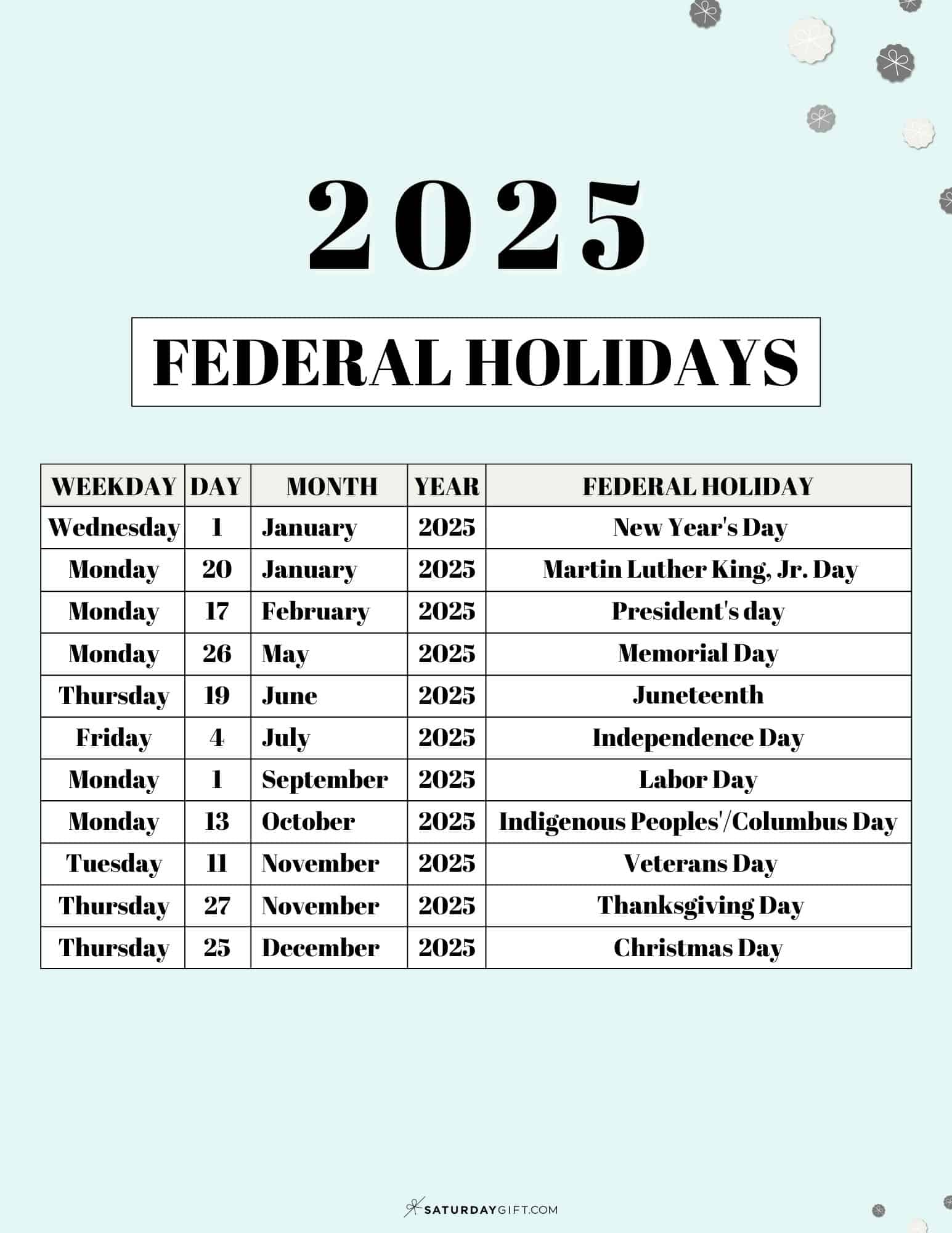Navigating the Federal Holiday Landscape: A Comprehensive Guide for 2025
Related Articles: Navigating the Federal Holiday Landscape: A Comprehensive Guide for 2025
Introduction
In this auspicious occasion, we are delighted to delve into the intriguing topic related to Navigating the Federal Holiday Landscape: A Comprehensive Guide for 2025. Let’s weave interesting information and offer fresh perspectives to the readers.
Table of Content
Navigating the Federal Holiday Landscape: A Comprehensive Guide for 2025

The federal holiday calendar plays a crucial role in shaping the rhythm of American life, providing designated periods for reflection, celebration, and remembrance. Understanding the federal holiday schedule for 2025 empowers individuals and businesses to plan accordingly, ensuring seamless operations and maximizing opportunities for personal and collective observance.
Federal Holidays in 2025: A Detailed Breakdown
The year 2025 features ten federal holidays, each with its unique historical and cultural significance.
-
New Year’s Day (Tuesday, January 1): Marking the commencement of a new year, New Year’s Day provides an opportunity for reflection on the past and anticipation for the future.
-
Martin Luther King, Jr. Day (Monday, January 20): Celebrated on the third Monday of January, this holiday honors the life and legacy of Dr. Martin Luther King, Jr., a pivotal figure in the Civil Rights Movement. It serves as a reminder of the ongoing struggle for equality and justice.
-
Presidents’ Day (Monday, February 17): Observed on the third Monday of February, Presidents’ Day acknowledges the contributions of all U.S. presidents, with a particular focus on George Washington and Abraham Lincoln. It is a day to reflect on leadership, service, and the values of democracy.
-
Memorial Day (Monday, May 26): Observed on the last Monday of May, Memorial Day honors the sacrifices of American military personnel who died in service to the nation. It is a day for remembrance, gratitude, and reflection on the enduring cost of freedom.
-
Juneteenth National Independence Day (Friday, June 19): This holiday, celebrated on June 19th, marks the emancipation of enslaved African Americans in the United States. It commemorates the end of slavery and celebrates the resilience and enduring spirit of Black Americans.
-
Independence Day (Thursday, July 3): Observed on July 4th, Independence Day celebrates the signing of the Declaration of Independence in 1776, marking the birth of the United States as an independent nation. It is a day of patriotic celebration and reflection on the principles of liberty and self-governance.
-
Labor Day (Monday, September 1): Celebrated on the first Monday of September, Labor Day honors the contributions and achievements of American workers. It recognizes the importance of the labor movement in securing workers’ rights and improving working conditions.
-
Columbus Day (Monday, October 13): Observed on the second Monday of October, Columbus Day commemorates the arrival of Christopher Columbus in the Americas. This holiday remains a subject of debate due to its historical inaccuracies and the impact of European colonization on indigenous populations.
-
Veterans Day (Wednesday, November 11): Observed on November 11th, Veterans Day honors all veterans who have served in the U.S. Armed Forces. It is a day to express gratitude for their service and sacrifice, recognizing their contributions to national security and global peace.
-
Thanksgiving Day (Thursday, November 27): Celebrated on the fourth Thursday of November, Thanksgiving Day is a time for gratitude, family gatherings, and feasting. It commemorates the historical Thanksgiving feast shared by Pilgrims and Wampanoag Native Americans in 1621.
The Importance of Federal Holidays
Federal holidays serve a multitude of purposes, contributing to the social, economic, and cultural fabric of the nation.
-
Historical Recognition and Remembrance: They provide an opportunity to commemorate significant historical events and figures, fostering a shared national identity and promoting understanding of the nation’s past.
-
Cultural Celebration and Unity: Holidays like Juneteenth and Thanksgiving Day celebrate diverse cultural traditions, promoting inclusivity and fostering a sense of belonging for all Americans.
-
Economic Impact: Federal holidays contribute to the economy by boosting retail sales, travel, and tourism. They also provide opportunities for workers to spend time with loved ones and recharge, leading to increased productivity.
-
Social and Personal Renewal: Holidays offer a chance to step away from daily routines, connect with family and friends, and engage in activities that promote well-being and personal growth.
FAQs: Addressing Common Questions about Federal Holidays in 2025
1. Are all federal holidays observed on the same day nationwide?
While the dates of federal holidays are standardized, the specific day of observance may vary depending on local or state regulations. For example, some states may observe Columbus Day as Indigenous Peoples’ Day, while others may recognize a different holiday altogether.
2. Are federal employees required to have all federal holidays off?
Yes, federal employees are generally entitled to paid leave on all federal holidays. However, certain agencies may have specific requirements or exceptions.
3. Do private businesses have to observe federal holidays?
Private businesses are not legally obligated to observe federal holidays, but many choose to do so as a matter of employee benefits or to align with cultural expectations.
4. Can federal holidays be changed or added?
The federal holiday calendar is subject to change through congressional legislation. New holidays can be added, and existing holidays can be modified or even abolished.
5. How can I stay updated on federal holiday changes?
The most reliable source for information on federal holidays is the official website of the U.S. Office of Personnel Management (OPM).
Tips for Effective Holiday Planning
-
Plan Ahead: Review the federal holiday calendar for 2025 well in advance to ensure smooth operations and minimize disruptions to business or personal schedules.
-
Communicate Clearly: Inform employees, clients, and stakeholders about holiday closures and any adjustments to business hours or services.
-
Embrace the Opportunity: Utilize holidays as a chance to engage in activities that promote employee well-being, strengthen company culture, and foster community connections.
-
Stay Informed: Monitor official government sources for any updates or changes to the federal holiday calendar.
Conclusion: The Enduring Significance of Federal Holidays
The federal holiday calendar is more than just a list of dates; it reflects the shared values, history, and cultural tapestry of the United States. By understanding and observing these holidays, individuals and businesses contribute to a vibrant national identity and participate in the ongoing narrative of American life. As we navigate the year 2025, let us embrace the opportunities for reflection, celebration, and remembrance that these designated periods offer.








Closure
Thus, we hope this article has provided valuable insights into Navigating the Federal Holiday Landscape: A Comprehensive Guide for 2025. We thank you for taking the time to read this article. See you in our next article!
